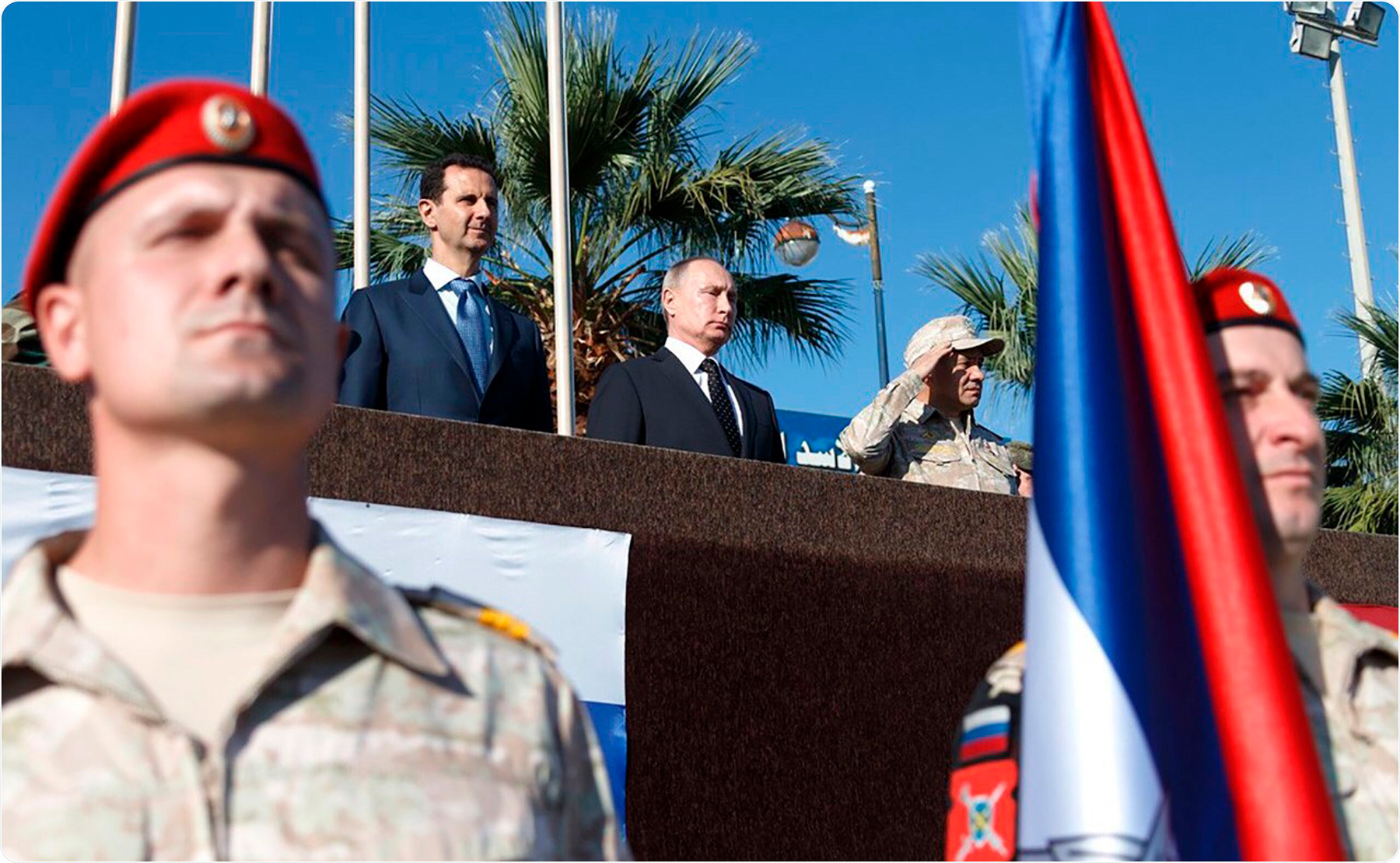The new year starts with cautious optimism for the Greek–Russian relations. The meeting between President Vladimir Putin and Prime Minister Kyriakos Mitsotakis in Sochi in December, 2021 was significant for two reasons. It has confirmed the willingness of Russia and Greece to leave the diplomatic crisis of 2018 behind and bring the bilateral relationship back to normalcy—after three years of arduous efforts.
Although tensions between Russia and NATO over Ukraine go beyond the capacity of Greece to influence these developments, the latter considers the preservation of communication channels essential. In the words of Mitsotakis during the press conference, ‘the absence of communication does not lead to anything good’. Hopefully, Greece would always advocate for a balanced and objective position on a number of issues pertaining to the interaction between Russia and the EU. As far as the Eastern Mediterranean is concerned, Russia is continuously reiterating its standard position about such a resolution of the Cyprus issue that ought to be built on the UN framework. The Greek Prime Minister publicly thanked the Russian President for this firm position.
It is symbolic that the visit of Kyriakos Mitsotakis to Russia, the first in his capacity as Prime Minister as he had already visited the country in February 2019 (then the leader of the main opposition New Democracy party), took place during the 200th anniversary of the Greek Revolution. Emotional celebrations and Russia’s active participation in them have facilitated the forging of a new type of understanding between the two countries.
Looking towards the future, the Joint Plan of Action for 2022–2024 offers an institutional umbrella for common actions where tourism will certainly play a critical role. Synergies in the handling of taxation issues, science, high technology, finance, and maritime security are expected to continue. This is also the case for closer cooperation between Greek and Russian universities, think tanks and research centers.
Greek-Russian discussions are not always easy. Russian appetite for new investments in Greece, for example, often turns into a complex and time-consuming process due to strict European regulations. Besides, energy talks do not automatically result in agreements on prices in accordance with the requests made by the one or the other side—however, these talks are taking place in good climate. On the whole, challenges did not prevent bilateral trade from growing by 56 per cent in the first nine months of this year as President Putin said. Notwithstanding the policy of sanctions, there is still room for Greek exporters to reach the Russian market.
The warm meeting between President Putin and Premier Mitsotakis marks the beginning of a new chapter in the Greek–Russian relations under the existing circumstances, where both sides raise expectations that they are able to meet.
The new year starts with cautious optimism for the Greek–Russian relations. The meeting between President Vladimir Putin and Prime Minister Kyriakos Mitsotakis in Sochi in December, 2021 was significant for two reasons. It has confirmed the willingness of Russia and Greece to leave the diplomatic crisis of 2018 behind and bring the bilateral relationship back to normalcy—after three years of arduous efforts.
More importantly, it has outlined their joint interest in placing this bilateral relationship into the general international environment and its contradictions. The two leaders thus used several adjectives to illustrate the nature of the Sochi discussions—such as ‘productive’, ‘constructive’, ‘substantive’, ‘open’, ‘direct’, and ‘sincere’.
Greece’s membership in the EU and NATO—the cornerstone of its foreign policy—does not allow illusions about the future course of the Greek–Russian relations, which could deviate from the Western framework. This reality, however, makes both countries keen on rather being pragmatic and setting realistic goals they can possibly fulfil. President Putin, for instance, has expressed the belief that Greece would always advocate for a balanced and objective position on a number of issues pertaining to the interaction between Russia and the EU. Premier Mitsotakis, for his part, has considered Russia to be essential to the architecture of European security, making a reference to the Ukraine crisis.
At the meeting, he was talking about the need of the Minsk agreements (among other accords) to be respected and implemented, and he concluded that the Greek government could not but be interested in a settlement as well as in non-aggravation, since many Greeks also live the region.
Although tensions between Russia and NATO over Ukraine go beyond the capacity of Greece to influence these developments, the latter considers the preservation of communication channels essential. In the words of Mitsotakis during the press conference, ‘the absence of communication does not lead to anything good’. Amid the ongoing debate in Europe, Greece belongs to the countries interested in Russia’s engagement in a dialogue with the EU. This position is shared by core member states of the EU, namely Germany, France and Italy.
As far as the Eastern Mediterranean is concerned, Russia is continuously reiterating its standard position about such a resolution of the Cyprus issue that ought to be built on the UN framework. The Greek Prime Minister publicly thanked the Russian President for this firm position. From another prism, the changing Eastern Mediterranean dynamics have brought Moscow and Ankara quite close in the last years, which is a source of concern for Athens.
This is another reality that has rendered Greece determined to mend ties with Russia. The rapprochement also serves the interests of Russia in the Eastern Mediterranean, which has certainly found a modus vivendi with Turkey while Moscow does not always agree with Ankara. In that regard, the principal advantage of the ties between Greece and Russia is their historical longevity.
It is symbolic that the visit of Kyriakos Mitsotakis to Russia, the first in his capacity as Prime Minister as he had already visited the country in February 2019 (then the leader of the main opposition New Democracy party), took place during the 200th anniversary of the Greek Revolution. Emotional celebrations and Russia’s active participation in them have facilitated the forging of a new type of understanding between the two countries.
Looking towards the future, the Joint Plan of Action for 2022–2024 offers an institutional umbrella for common actions where tourism will certainly play a critical role. President Putin has commended relevant bilateral collaboration during the coronavirus crisis, saying: ‘We are grateful to the Greek authorities for the decision to recognize Russian Sputnik V vaccination certificates.’ Synergies in the handling of taxation issues, science, high technology, finance, and maritime security are expected to continue. This is also the case for closer cooperation between Greek and Russian universities, think tanks and research centers.
Greek-Russian discussions are not always easy. Russian appetite for new investments in Greece, for example, often turns into a complex and time-consuming process due to strict European regulations. Besides, energy talks do not automatically result in agreements on prices in accordance with the requests made by the one or the other side—however, these talks are taking place in good climate. One day before the meeting of the two leaders in Sochi, Kostas Skrekas, Greek Minister of the Environment and Energy, met with Gazprom Chairman, Alexey Miller, in St. Petersburg. On the whole, challenges did not prevent bilateral trade from growing by 56 per cent in the first nine months of this year as President Putin said. Notwithstanding the policy of sanctions, there is still room for Greek exporters to reach the Russian market.
The warm meeting between President Putin and Premier Mitsotakis marks the beginning of a new chapter in the Greek–Russian relations under the existing circumstances, where both sides raise expectations that they are able to meet. There was no better way to launch this new chapter than with the announcement of President Putin to transfer the archives of its Jewish communities to Greece, which the Nazis moved to Germany during World War II and which have been in Moscow since 1945. This is another emotionally significant development in a special year.
Following the Sochi meeting, Premier Mitsotakis and his Russian counterpart Mikhail Mishustin had a telephone conversation to discuss the Joint Action Plan 2022–2024. Moreover, President Putin sent a letter to the Greek Prime Minister wishing ‘peace and prosperity to our friends, the Greek people.’ This good climate is beneficial for Russia and Greece, which are both striving for stability, continuity and progress in the bilateral relationship.






